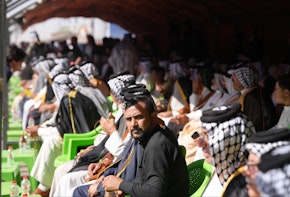Influential armed groups continue to confound policymakers, diplomats, and analysts decades after their transformational arrival on the scene in the Middle East and North Africa.
The most effective of these militias can most usefully be understood as hybrid actors, which simultaneously work through, with, and against the state.
This joint report from The Century Foundation identifies the factors that make some hybrid actors persistent and successful, as measured by longevity, influence, and ability to project power militarily as well as politically. It finds that three factors correlate most closely with impact: constituent loyalty, resilient state relationships, and coherent ideology.
The authors of this report examined cases in Lebanon, Syria, and Iraq, drawing on years of fieldwork, to distinguish between hybrid actors, classic nonstate proxies, and aspirants to statehood—all of which merit different analytical and policy treatment. The report demonstrates the ways that groups can shift along a spectrum as they adapt to changing conditions.
This report was written by Thanassis Cambanis, Dina Esfandiary, Sima Ghaddar, Michael Wahid Hanna, Aron Lund, and Renad Mansour.
Read the executive summary and introduction online here.





